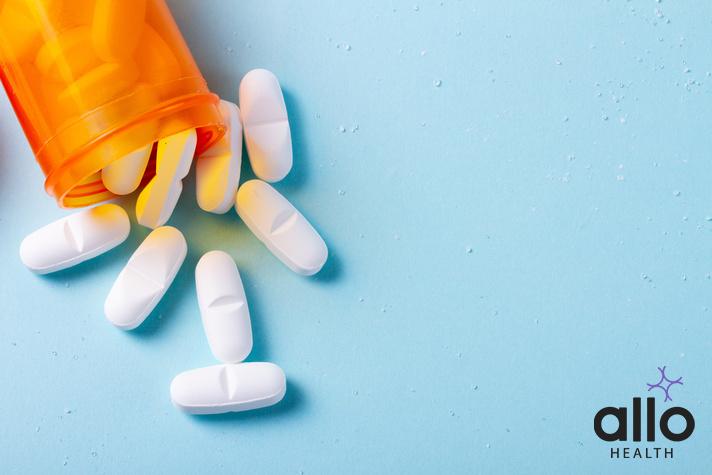Understanding The Effect Time of Tadalafil

Allo Health is dedicated to personalized well-being, offering support and trusted information tailored to individual health goals. The platform emphasizes human-generated content, led by a distinguished medical team of experts, including physicians and sexual health specialists. Their commitment to credibility involves rigorous fact-checking, authoritative research, and continuous updates to ensure accurate, up-to-date information. Allo Health's unique approach goes beyond conventional platforms, providing expert-led insights and a continuous commitment to excellence, with user feedback playing a crucial role in shaping the platform's authoritative voice.

Dr Sanina Mansoor holds MBBS degree from Yenepoya university,Mangalore.She has 8 years of experience working as a medical officer at various health centres and medical colleges.
Why This Was Upated?
Our experts continually monitor the health and wellness space, and we update our articles when new information became available.
Updated on 16 February, 2024
- Article was updated as part of our commitment to diversity, equity, and inclusion.

"The following blog article provides information about a drug or brand name drug and its potential effects or benefits. However, it is crucial to understand that this information is intended for general educational purposes only and should not be considered a substitute for professional medical consultation. It is highly recommended to consult with a qualified healthcare professional before making any decisions regarding medication, treatment, or healthcare management.
Book consultation
Individuals have unique medical conditions, and the information provided in this article may not be applicable to everyone. Only a qualified healthcare provider can evaluate your specific medical situation, taking into account your medical history, conducting appropriate tests, and providing personalized advice and recommendations. They are equipped to make informed decisions tailored to your individual needs.
It is crucial to emphasize that self-diagnosis, self-medication, or disregarding medical advice can have serious health consequences. This article may reference specific brand names or drugs for illustrative purposes. Mention of these names does not imply endorsement, recommendation, or guarantee of their efficacy or safety. The choice of medication should be based on discussions and individualized guidance from a healthcare professional who has a comprehensive understanding of your medical condition.
"Tadalafil is a medication commonly used to treat erectile dysfunction. It is known to be highly effective, with many men reporting that it helps them achieve and maintain erections. But one of the most important things to understand about tadalafil is its effect time. In this article, we will explore everything you need to know about tadalafil and its effect time, including how it works, different forms available, how long it takes to take effect, factors that can affect its effect time, and much more.
What Is Tadalafil?
Tadalafil is a medication primarily used to treat erectile dysfunction (ED) in men. It belongs to a class of drugs known as phosphodiesterase type 5 (PDE5) inhibitors. The primary brand name for Tadalafil is Cialis, although generic versions are also available.
- Indications: Tadalafil is mainly prescribed for the treatment of erectile dysfunction, a condition characterized by the inability to achieve or maintain an erection sufficient for sexual activity. Additionally, it is used to treat symptoms of benign prostatic hyperplasia (BPH), a condition where the prostate gland becomes enlarged, causing difficulties in urination.
- Dosage Forms: Tadalafil is available in various dosage forms, including tablets, which are taken orally. The drug is typically taken on an as-needed basis for erectile dysfunction, with a recommended starting dose of 10 mg before sexual activity. The dose may be adjusted based on individual response and tolerability. For daily use in the treatment of BPH, lower doses may be prescribed.
- Duration of Action: Tadalafil is known for its longer duration of action compared to other PDE5 inhibitors. Its effects can last up to 36 hours, earning it the nickname “the weekend pill.” This prolonged duration allows for greater flexibility in sexual activity.
- Side Effects: Common side effects of Tadalafil include headache, indigestion, back pain, muscle aches, flushing, and stuffy or runny nose. Serious side effects are rare but may include sudden vision loss or changes, hearing loss, and priapism (prolonged erection). Individuals with a history of cardiovascular concerns should use Tadalafil with caution.
- Contraindications: Tadalafil is contraindicated in individuals who are taking nitrates or nitric oxide donors, as combining these medications can lead to a sudden drop in blood pressure. It should also be used with caution in those with certain medical conditions, such as heart concerns, liver or kidney impairment, and anatomical deformation of the penis.
- Interactions: Tadalafil may interact with other medications, including alpha-blockers, antihypertensives, and certain antifungal or antibiotic drugs. It is important to inform healthcare providers of all medications being taken to avoid potential interactions.
It is crucial to consult with a healthcare professional before using it, as they can provide personalized advice based on an individual’s medical history and overall health. Self-medication and misuse of Tadalafil can have adverse effects, and a healthcare provider’s guidance is essential for safe and effective use.

How Does Tadalafil Work?
Tadalafil works by inhibiting the enzyme phosphodiesterase type 5 (PDE5), which plays a crucial role in the regulation of cyclic guanosine monophosphate (cGMP) in the body. Understanding the physiological process involved can help explain how Tadalafil functions:
- Normal Erectile Function:
- Sexual stimulation leads to the release of nitric oxide (NO) in the erectile tissue of the penis during sexual arousal.
- Nitric oxide activates an enzyme called guanylate cyclase, which increases the production of cyclic guanosine monophosphate (cGMP) from guanosine triphosphate (GTP).
- Role of cGMP:
- Cyclic GMP is a signaling molecule that relaxes the smooth muscles in the walls of blood vessels in the penis, allowing them to dilate.
- Dilation of blood vessels in the penis leads to an increased blood flow, resulting in an erection.
- PDE5 Enzyme:
- Phosphodiesterase type 5 (PDE5) is an enzyme that naturally breaks down cGMP in the penis.
- As cGMP is broken down by PDE5, the smooth muscles in the penile blood vessels contract, reducing blood flow and causing the erection to subside.
- Tadalafil’s Mechanism of Action:
- Tadalafil is a PDE5 inhibitor, meaning it blocks the action of PDE5.
- By inhibiting PDE5, Tadalafil prevents the breakdown of cGMP, allowing cGMP levels to remain elevated for a longer duration.
- Increased cGMP Levels:
- With elevated cGMP levels, the smooth muscles in the penile blood vessels remain relaxed.
- This sustained relaxation facilitates increased blood flow into the penis, leading to improved erectile function.
- Prolonged Duration of Action:
- Tadalafil is known for its longer duration of action compared to other PDE5 inhibitors. While other medications in the same class may have a shorter duration, Tadalafil’s effects can last up to 36 hours.
- This extended period of efficacy allows for greater flexibility in sexual activity and has earned Tadalafil the nickname “the weekend pill.”
It’s important to note that Tadalafil does not cause an erection on its own; sexual stimulation is still required to initiate the release of nitric oxide and the natural erectile response. Additionally, the effectiveness of Tadalafil can vary among individuals, and the dosage may need to be adjusted based on factors such as age, overall health, and the presence of underlying medical conditions. As with any medication, it’s crucial to follow the prescribed dosage and consult with a healthcare professional for personalized advice and monitoring.
Understanding The Effect Time of Tadalafil
The onset and duration of Tadalafil’s effects can vary among individuals, and factors such as individual response, the presence of food in the stomach, and overall health can influence its pharmacokinetics. Here’s a detailed overview of the effect time of Tadalafil:
- Onset of Action: Tadalafil typically begins to take effect within 30 minutes to 2 hours after ingestion. The onset can be affected by various factors, including the individual’s metabolism, the presence of food in the stomach, and the specific formulation of the medication.
- Food and Timing: Tadalafil can be taken with or without food. But, consuming a high-fat meal before taking Tadalafil may delay its onset of action. This is because a fatty meal can slow down the absorption of the drug, leading to a delayed peak concentration in the bloodstream.
- Peak Concentration: The peak concentration of Tadalafil in the bloodstream is typically reached 2 hours after ingestion. This is the point at which the drug is present in the highest concentration in the body.
- Duration of Action:
- One of the distinctive features of Tadalafil is its longer duration of action compared to other PDE5 inhibitors. The effects of Tadalafil can last up to 36 hours, allowing for a more extended window of opportunity for sexual activity.
- This prolonged duration of action has led to Tadalafil being commonly referred to as “the weekend pill.” It provides increased flexibility, as individuals can take the medication on an as-needed basis and still have the freedom to engage in sexual activity over an extended period.
- Individual Variability: Individual responses to Tadalafil can vary, and some people may experience the onset of action sooner or later than the average time frame. Factors such as age, liver function, and overall health can contribute to this variability.
- Multiple Dosing Options: Tadalafil is available in various dosages, including 2.5 mg, 5 mg, 10 mg, and 20 mg tablets. The choice of dosage depends on the individual’s response, the severity of erectile dysfunction, and the prescribing healthcare professional’s recommendations.
- Daily vs. As-Needed Use: Tadalafil is available for both daily use and as-needed use. For daily use, lower doses are prescribed, providing a continuous low level of the medication in the bloodstream. For as-needed use, higher doses may be recommended, taken before anticipated sexual activity.
It’s essential for individuals to follow their healthcare provider’s guidance regarding the appropriate dosage and timing for Tadalafil use. As with any medication, it’s crucial to use Tadalafil as prescribed and to consult with a healthcare professional if there are any concerns or questions about its use or potential interactions with other medications.
Most Asked Questions
-
How quickly does Tadalafil start working after consumption?
Tadalafil typically begins to take effect within 30 minutes to 2 hours after ingestion. The onset can be influenced by factors such as individual metabolism, the presence of food in the stomach, and the specific formulation of the medication. It is essential to note that sexual stimulation is still required to initiate the natural erectile response.
-
Can food affect the onset of Tadalafil's action?
Tadalafil can be taken with or without food. But, consuming a high-fat meal before taking Tadalafil may delay its onset of action. This is because a fatty meal can slow down the absorption of the drug, leading to a delayed peak concentration in the bloodstream. Choosing a consistent approach with food or without it can help maintain predictability in response.
-
When does Tadalafil reach its peak concentration in the bloodstream?
The peak concentration of Tadalafil in the bloodstream is typically reached 2 hours after ingestion. At this point, the drug is present in the highest concentration in the body. Understanding the timing of peak concentration can be helpful for individuals planning sexual activity and aiming to optimize the effectiveness of the medication.
-
What sets Tadalafil apart in terms of duration of action?
One distinctive feature of Tadalafil is its longer duration of action compared to other PDE5 inhibitors. The effects of Tadalafil can last up to 36 hours, providing a more extended window for sexual activity. This prolonged duration has led to Tadalafil being known as "the weekend pill," offering increased flexibility and spontaneity.
-
How does individual variability impact the onset of Tadalafil's effects?
Individual responses to Tadalafil can vary based on factors such as age, liver function, and overall health. Some individuals may experience the onset of action sooner or later than the average time frame. It's important for users to be aware of their individual response and consult with their healthcare provider for personalized recommendations on dosage and timing.






































